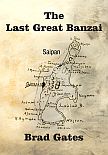The Last Great Banzai: Saipan, 1944
Bradley Mason Gates is a retired Marine Corps lieutenant colonel. He holds a B.S. in education from Millersville University, in Pennsylvania, and a MPA in public administration from Golden Gate University, in California. During his career, Brad participated in Operation Urgent Fury in Grenada, and later commanded the Marine Corps artillery force in Beirut, Lebanon. In 1985, Brad received the General John A. Lejeune Award for Inspirational Leadership, and in 1987 he received the George Washington Honor Medal from the Freedoms Foundation at Valley Forge. In 1984, Brad attended the 40th Anniversary of survivors of the Saipan suicide attack of 1944, the subject of this book. He subsequently spent almost ten years conducting personal interviews and other research on the attack, including a trip to Saipan in 1992. Brad and his wife Kathy, also a graduate of Millersville University, met while they were students. They have three children and five grandchildren.
 On July 7, 1944, all remaining Japanese forces on Saipan conducted a massive suicide attack against the American forces that had landed on the island several weeks earlier. At approximately 3am, the Japanese forces rushed southward on the Tanapag Plain and overwhelmed the soldiers of the U.S. Army’s 27th Infantry Division. Hundreds of Japanese soldiers continued unimpeded for 1,200 yards, where they came upon the U.S. Marine artillerymen of the 3rd Battalion of the 10th Marine Regiment of the 2nd Marine Division. Direct howitzer and machine gun fire slowed, but did not stop, the massive suicide attack. The howitzer batteries, as well as headquarters battery, were overrun, and the Marines banded together in small pockets with rifles and pistols in an effort to hold off the Japanese. Against formidable odds, the Marines withstood continued Japanese attacks for nearly twelve hours until soldiers from other units fought their way forward and finally stopped the charge. The scene of carnage on the Tanapag Plain the next day was indescribable. The Marines who survived the attack were in shock. Those who observed the aftermath of the battle could not believe it had happened, but it was one of the most dramatic days in military history.
On July 7, 1944, all remaining Japanese forces on Saipan conducted a massive suicide attack against the American forces that had landed on the island several weeks earlier. At approximately 3am, the Japanese forces rushed southward on the Tanapag Plain and overwhelmed the soldiers of the U.S. Army’s 27th Infantry Division. Hundreds of Japanese soldiers continued unimpeded for 1,200 yards, where they came upon the U.S. Marine artillerymen of the 3rd Battalion of the 10th Marine Regiment of the 2nd Marine Division. Direct howitzer and machine gun fire slowed, but did not stop, the massive suicide attack. The howitzer batteries, as well as headquarters battery, were overrun, and the Marines banded together in small pockets with rifles and pistols in an effort to hold off the Japanese. Against formidable odds, the Marines withstood continued Japanese attacks for nearly twelve hours until soldiers from other units fought their way forward and finally stopped the charge. The scene of carnage on the Tanapag Plain the next day was indescribable. The Marines who survived the attack were in shock. Those who observed the aftermath of the battle could not believe it had happened, but it was one of the most dramatic days in military history.
ACADEMICA PRESS
1727 Massachusetts Avenue, NW, Suite 507
Washington, DC 20036
academicapress.editorial@gmail.com
